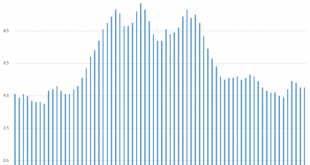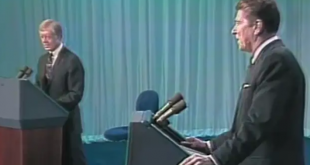Today’s headlines announced Donald and Melania Trump “tested positive” for covid-19. Another claims nineteen thousand Amazon workers “got” covid-19 on the job. Both of these pseudostories are sure to ignite another absurd media frenzy. As always, the story keeps changing: Remember ventilators, flatten the curve, the next two weeks are crucial, etc.? Remember Nancy Pelosi in Chinatown back in February, urging everyone to visit? Remember Fauci dismissing masks as...
Read More »The 2020 Debate: A Breakdown
Ryan McMaken and Tho Bishop talk about Tuesday’s debate, why “the issues” don’t matter, and why the debate probably won’t change the minds of many voters. And be sure to follow Radio Rothbard at mises.org/RadioRothbard. You Might Also Like A Review of Stephanie Kelton’s The Deficit Myth The good news is that Stephanie Kelton has written a book on MMT that is very readable and will strike many readers as...
Read More »Rising Homicides This Year May Be Yet Another Side Effect of Covid Lockdowns
During Tuesday’s presidential debate, former vice president Biden attempted to paint Donald Trump as the bad-on-crime candidate when he claimed that crime had gone down during the Obama administration but increased during Trump’s term. Whether or not this is a plausible claim depends on how one looks at the data. And given that law enforcement and criminal prosecutions for street crime are generally a state and local matter, it’s unclear why any president ought to be...
Read More »If the US Adopts Eurozone Policies, the Jobs Recovery Will Suffer
The employment recovery in the United States is as impressive as the collapse due to the lockdowns. In April I wrote a column stating that “The U.S. Labor Market Can Heal Quickly,” and the improvement has been positive. Very few would have expected the unemployment rate to be at 8.4 percent in August after soaring to almost 15 percent in the middle of the pandemic. This means that the unemployment rate is in August 2020 lower than what analysts projected for the end...
Read More »Why “Taxing the Rich” Doesn’t Make Us Better Off
The complete confiscation of all private property is tantamount to the introduction of socialism. Therefore we do not have to deal with it in an analysis of the problems of interventionism. We are concerned here only with the partial confiscation of property. Such confiscation is today attempted primarily by taxation. The ideological motivations of such action are immaterial. The only question of interest to us is merely: What is sought by these measures and what is...
Read More »Mises and Moral Relativism
I heard several days ago from my friend Larry Beane that people in Walter Block’s seminar who had been reading Theory and History wondered whether Mises is a moral relativist. As I’ll try to show, the answer depends on what you mean by “moral relativist,” but in the way the term is usually understood in contemporary philosophy, he isn’t. I’d like to dedicate this article to the memory of Leo Beane, an outstanding young man of great character and intelligence who was...
Read More »Rent Control Is Bad for Renters, but Good for Politicians
Ontario’s ever-changing rent control policies prove that politicians are just as committed to flip-flopping as the Minnesota Vikings are to not winning the Super Bowl. Rent Control as a Means of Buying Votes Ontario's modern history of rent control legislation began during the 1975 election campaign, when it was actively promoted by the New Democratic Party (NDP). This was the stagflation era, and the NDP conveniently ignored Canadian monetary policy as a...
Read More »Compulsory vs. Free Education
[unable to retrieve full-text content][A selection from Education: Free and Compulsory.] The Reverend George Harris described the effects of compulsory education in imposing uniformity and enforced equality (soon after the establishment of compulsion).
Read More »Carter vs. Reagan: The Last Semi-Intelligent Presidential Race
Carter vs. Reagan Presidential campaigns in the United States tend to be discouraging affairs, even if one is not a libertarian who has zero expectations that anything good can come from American elections. The old saw that insanity consists of doing the same thing repeatedly and somehow expecting different results applies to presidential campaigns as well as to anything else. For whatever reason, Americans (and especially the American media) seem to believe that the...
Read More »Inflation: Its Effects and Failures
Inflationism is that policy which by increasing the quantity of money or credit seeks to raise money prices and money wages or seeks to counteract a decline of money prices and money wages which threatens as the result of an increase in the supply of consumers’ goods. In order to understand the economic significance of inflationism we have to refer to a fundamental law of monetary theory. This law says: The service which money renders to the economic community is...
Read More » Swiss Economicblogs.org
Swiss Economicblogs.org









